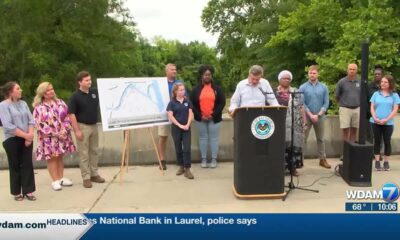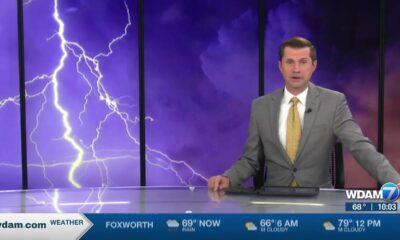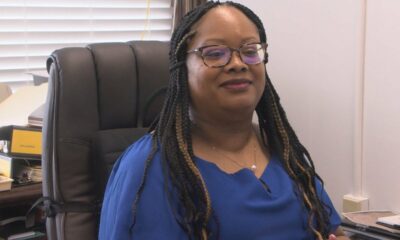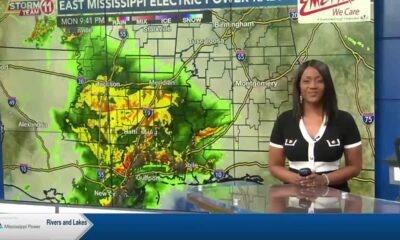Kaiser Health News
Most Americans Say They or a Family Member Has Experienced Gun Violence
by Liz Szabo, Kaiser Health News
Tue, 11 Apr 2023 09:01:00 +0000
A majority of Americans say they or a family member has experienced gun violence, such as witnessing a shooting, being threatened by a person with a gun, or being shot, according to a sweeping new survey.
The national survey of 1,271 adults conducted by KFF revealed the severe physical and psychological harm exacted by firearm violence, especially in minority communities.
Nearly 1 in 5 respondents , including 34% of Black adults, 18% of Hispanic adults, and 17% of white adults, said a family member had been killed by a gun.
The survey “confirms that firearm-related injuries are ubiquitous,” said Dr. Selwyn Rogers, a surgeon and founding director of the UChicago Medicine trauma center. “For every person killed, there are two or three people harmed. These are people who have had fractures, who may have been paralyzed or disabled.”
Beyond causing physical injuries, gun violence has left many Americans living with trauma and fear, Rogers said.
Just over half of adults say gun-related crimes, injuries, and deaths are a “constant threat” or “major concern” in their communities. Black and Hispanic adults were more likely than white adults to describe gun violence as a constant threat or major concern. About 3 in 10 Black or Hispanic adults say they feel “not too safe” or “not safe at all” from gun violence in their neighborhoods. (Hispanics can be of any race or combination of races.)
Women also reported high rates of concern about firearm violence, with 58% saying gun-related crimes are a constant threat or major concern, compared with 43% of men. More than half of intimate partner homicides are committed with guns.
Parents are worried about their children as well.
About 1 in 4 parents of children under 18 say they worry daily or almost daily about gun violence, the KFF survey found, and 84% of adults report having taken at least one precaution to reduce their family's risk from gun violence. More than one-third of adults say they have avoided large crowds, such as at music festivals or crowded bars, for example.
Gun violence surged during the pandemic. There were a record 48,830 firearm-related deaths in 2021, an increase of 23% from 2019, according to an analysis by the Pew Research Center. The increase among children was even sharper. Firearm deaths among Americans under 18 — which include those due to homicide, suicide, and gun-related accidents — increased 50%, from 1,732 in 2019 to 2,590 in 2021.
Guns have become the leading cause of death among children and adolescents ages 1 to 19, according to the Centers for Disease Control and Prevention.
The pandemic also coincided with a huge increase in gun purchases, which grew an estimated 64% from 2019 to 2020.
According to the KFF survey, 29% of adults have purchased a gun at some point to protect themselves or their families, with 44% of parents of children under 18 keeping a gun in the home. Yet 78% of parents in gun-owning households fail to follow safety recommendations, such as locking guns and ammunition, storing guns unloaded, and storing guns and ammunition separately, practices that have been shown to reduce the risk of thefts, accidents, and suicides.
Dr. Abdullah Pratt, an emergency physician at the UChicago Medicine trauma center, has lost a dozen close friends to gun violence, including his brother. His father never recovered from that loss and died about seven years later, at age 64.
“As soon as my brother got killed, he stopped taking his medications and started chain-smoking out of nowhere,” Pratt said.
Gun violence also wears away communities, Pratt said.
In neighborhoods with high crime rates, the daily drumbeat of loss can lead residents to conclude there's no point in voting, going to school, or trying to improve their lives. “They think, ‘What am I voting for if I can't have basic access to safety on a day-to-day basis?'” Pratt said.
And while mass shootings and homicides grab headlines, Rogers, the surgeon, noted that suicides account for more than half of firearm-related deaths in the U.S. and cause ripples of grief throughout a community. Researchers estimate that every suicide leaves at least six people in mourning.
Pratt said he feels guilty he wasn't able to help a close friend who died by suicide with a gun several years ago. The man had recently lost a job and had his car repossessed and came to Pratt to talk about his troubles. Instead, Pratt spent the visit asking for parenting advice, without realizing how much his friend was hurting.
“There were no red flags,” Pratt said. “A couple days later, he died.”
Gun violence has also shaped the trajectory of Bernice Grisby's life.
Grisby, now 35, was shot for the first time when she was 8, while playing on the swings at her school in Oakland, California. She was shot a second time at age 15, when she was talking to friends after school. One of her friends died that day, while another lost an eye; Grisby was shot in the hip and experiences chronic pain from the wound.
Two of her brothers were fatally shot in their 20s. Her 15-year-old daughter was recently robbed at gunpoint.
Rather than leaving Oakland, Grisby is trying to save it. She works as a street counselor to young people at high risk of gun violence through Oakland's East Bay Asian Youth Center, which aims to help young people living in poverty, trauma, and neglect.
“My life is a gift from God,” Grisby said. “I am happy to be here to support the youth and know that I am making a difference.”
By: Liz Szabo, Kaiser Health News
Title: Most Americans Say They or a Family Member Has Experienced Gun Violence
Sourced From: kffhealthnews.org/news/article/kff-survey-gun-violence-majority-of-americans/
Published Date: Tue, 11 Apr 2023 09:01:00 +0000
Did you miss our previous article…
https://www.biloxinewsevents.com/doctor-shortages-distress-rural-america-where-few-residency-programs-exist/
Kaiser Health News
Nursing Homes Wield Pandemic Immunity Laws To Duck Wrongful Death Suits
Fred Schulte, KFF Health News
Tue, 14 May 2024 09:00:00 +0000
In early 2020, with reports of covid-19 outbreaks making dire headlines, Trever Schapers worried about her father's safety in a nursing home in Queens.
She had delighted in watching her dad, John Schapers, blow out the candles on his 90th birthday cake that February at the West Lawrence Care Center in the New York City borough. Then the home went into lockdown.
Soon her father was dead. The former union painter spiked a fever and was transferred to a hospital, where he tested positive for covid, his daughter said, and after two weeks on a ventilator, he died in May 2020.
But when Trever Schapers sued the nursing home for negligence and wrongful death in 2022, a judge dismissed the case, citing a New York state law hastily passed early in the pandemic. It granted immunity to medical providers for “harm or damages” from an “act or omission” in treating or arranging care for covid. She is appealing the decision.
“I feel that families are being ignored by judges and courts not recognizing that something needs to be done and changed,” said Schapers, 48, who works in the medical field. “There needs to be accountability.”
The nursing home did not return calls seeking comment. In a court filing, the home argued that Schapers offered no evidence that the home was “grossly negligent” in treating her father.
More than four years after covid first raged through many U.S. nursing homes, hundreds of lawsuits blaming patient deaths on negligent care have been tossed out or languished in the courts amid contentious legal battles.
Even some nursing homes that were shut down by health officials for violating safety standards have claimed immunity against such suits, court records show. And some families that allege homes kept them in the dark about the health of their loved ones, even denying there were cases of covid in the building, have had their cases dismissed.
Schapers alleged in a complaint to state health officials that the nursing home failed to advise her that it had admitted covid-positive patients from a nearby hospital in March 2020. In early April, she received a call telling her the facility had some covid-positive residents.
“The call I received was very alarming, and they refused to answer any of my questions,” she said.
About two weeks later, a social worker called to say that her father had a fever, but the staff did not test him to confirm covid, according to Schapers' complaint.
The industry says federal health officials and lawmakers in most states granted medical providers broad protection from lawsuits for good faith actions during the health emergency. Rachel Reeves, a senior vice president with the American Health Care Association, an industry trade group, called covid “an unprecedented public health crisis brought on by a vicious virus that uniquely targeted our population.”
In scores of lawsuits, however, family members allege that nursing homes failed to secure enough protective gear or tests for staffers or residents, haphazardly mixed covid-positive patients with other residents, failed to follow strict infection control protocols, and brazenly misled frightened families about the severity of covid outbreaks among patients and staff.
“They trusted these facilities to take care of loved ones, and that trust was betrayed,” said Florida attorney Lindsey Gale, who has represented several families suing over covid-related deaths.
“The grieving process people had to go through was horrible,” Gale said.
A Deadly Toll
KFF Health News found that more than 1,100 covid-related lawsuits, most alleging wrongful death or other negligent care, were filed against nursing homes from March 2020 through March of this year.
While there's no full accounting of the outcomes, court filings show that judges have dismissed some suits outright, citing state or federal immunity provisions, while other cases have been settled under confidential terms. And many cases have stalled due to lengthy and costly arguments and appeals to hash out limits, if any, of immunity protection.
In their defense, nursing homes initially cited the federal Public Readiness and Emergency Preparedness Act, which Congress passed in December 2005. The law grants liability protection from claims for deaths or injuries tied to vaccines or “medical countermeasures” taken to prevent or treat a disease during national emergencies.
The PREP Act steps in once the secretary of Health and Human Services declares a “public health emergency,” which happened with covid on March 17, 2020. The emergency order expired on May 11, 2023.
The law carved out an exception for “willful misconduct,” but proving it occurred can be daunting for families — even when nursing homes have long histories of violating safety standards, including infection controls.
Governors of at least 38 states issued covid executive orders, or their legislatures passed laws, granting medical providers at least some degree of immunity, according to one consumer group's tally. Just how much legal protection was intended is at the crux of the skirmishes.
Nursing homes answered many negligence lawsuits by getting them removed from state courts into the federal judicial system and asking for dismissal under the PREP Act.
For the most part, that didn't work because federal judges declined to hear the cases. Some judges ruled that the PREP Act was not intended to shield medical providers from negligence caused by inaction, such as failing to protect patients from the coronavirus. These rulings and appeals sent cases back to state courts, often after long delays that left families in legal limbo.
“These delays have been devastating,” said Jeffrey Guzman, a New York City attorney who represents Schapers and other families. He said the industry has fought “tooth and nail” trying to “fight these people getting their day in court.”
Empire State Epicenter
New York, where covid hit early and hard, is ground zero for court battles over nursing home immunity.
Relatives of residents have filed more than 750 negligence or wrongful death cases in New York counties since the start of the pandemic, according to court data KFF Health News compiled using the judicial reporting service Courthouse News Service. No other area comes close. Chicago's Cook County, a jurisdiction where private lawyers for years have aggressively sued nursing homes alleging poor infection control, recorded 121 covid-related cases.
Plaintiffs in hundreds of New York cases argue that nursing homes knew early in 2020 that covid would pose a deadly threat but largely failed to gird for its impact. Many suits cite inspection reports detailing chronic violations of infection control standards in the years preceding the pandemic, court records show. Responses to this strategy vary.
“Different judges take different views,” said Joseph Ciaccio, a New York lawyer who has filed hundreds of such cases. “It's been very mixed.”
Lawyers for nursing homes counter that most lawsuits rely on vague allegations of wrongdoing and “boilerplate” claims that, even if true, don't demonstrate the kind of gross negligence that would override an immunity claim.
New York lawmakers added another wrinkle by repealing the immunity statute in April 2021 after Attorney General Letitia James noted the law could give nursing homes a free pass to make “financially motivated decisions” to cut costs and put patients at risk.
So far, appeals courts have ruled lawmakers didn't specify that the repeal should be made retroactive, thus stymying many negligence cases.
“So these cases are all wasting the courts' time and preventing cases that aren't barred by immunity statutes from being resolved sooner and clogging up the court system that was already backlogged from COVID,” said attorney Anna Borea, who represents nursing homes.
Troubled Homes Deflect Suits
Some nursing homes that paid hefty fines or were ordered by health officials to shut down at least temporarily because of their inadequate response to covid have claimed immunity against suits, court records show.
Among them is Andover Subacute and Rehabilitation nursing home in New Jersey, which made national headlines when authorities found 17 bodies stacked in a makeshift morgue in April 2020.
Federal health officials fined the facility $220,235 after issuing a critical 36-page report on covid violations and other deficiencies, and the state halted admissions in February 2022.
Yet the home has won court pauses in at least three negligence lawsuits as it appeals lower court rulings denying immunity under the federal PREP Act, court records show. The operators of the home could not be reached for comment. In court filings, they denied any wrongdoing.
In Oregon, health officials suspended operations at Healthcare at Foster Creek, calling the Portland nursing home “a serious danger to the public health and safety.” The May 2020 order cited the home's “consistent inability to adhere to basic infection control standards.”
Bonnie Richardson, a Portland lawyer, sued the facility on behalf of the family of Judith Jones, 75, who had dementia and died in April 2020. Jones' was among dozens of covid-related deaths at that home.
“It was a very hard-fought battle,” said Richardson, who has since settled the case under confidential terms. Although the nursing home claimed immunity, her clients “wanted to know what happened and to understand why.” The owners of the nursing home provided no comment.
No Covid Here
Many families believe nursing homes misled them about covid's relentless spread. They often had to settle for window visits to connect with their loved ones.
Relatives of five patients who died in 2020 at the Sapphire Center for Rehabilitation and Nursing in the Flushing neighborhood in Queens filed lawsuits accusing the home's operators of keeping them in the dark.
When they phoned to check on elderly parents, they either couldn't get through or were told there was “no COVID-19 in the building,” according to one court affidavit.
One woman grew alarmed after visiting in February 2020 and seeing nurses wearing masks “below their noses or under their chin,” according to a court affidavit.
The woman was shocked when the home relayed that her mother had died in April 2020 from unknown causes, perhaps “from depression and not eating,” according to her affidavit.
A short time later, news media reported that dozens of Sapphire Center residents had died from the virus — her 85-year-old mother among them, she argued in a lawsuit.
The nursing home denied liability and won dismissal of all five lawsuits after citing the New York immunity law. Several families are appealing. The nursing home's administrator declined to comment.
Broadening Immunity
Nursing home operators also have cited immunity to foil negligence lawsuits based on falls or other allegations of substandard care, such as bedsores, with little obvious connection to the pandemic, court records show.
The family of Marilyn Kearney, an 89-year-old with a “history of dementia and falls,” sued the Watrous Nursing Center in Madison, Connecticut, for negligence. Days after she was admitted in June 2020, she fell in her room, fracturing her right hip and requiring surgery, according to court filings.
She died at a local hospital on Sept. 16, 2020, from sepsis attributed to dehydration and malnutrition, according to the suit.
Her family argued that the 45-bed nursing home failed to assess her risk of falling and develop a plan to prevent that. But Watrous fired back by citing an April 2020 declaration by Connecticut Gov. Ned Lamont, a Democrat, granting health care professionals or facilities immunity from “any injury or death alleged to have been sustained because of the individual's or health care facility's acts or omissions undertaken in good faith while providing health care services in support of the state's COVID-19 response.”
Watrous denied liability and, in a motion to dismiss the case, cited Lamont's executive order and affidavits that argued the home did its best in the throes of a “public health crisis, the likes of which had never been seen before.” The operators of the nursing home, which closed in July 2021 because of covid, did not respond to a request for comment. The case is pending.
Attorney Wendi Kowarik, who represents Kearney's family, said courts are wrestling with how much protection to afford nursing homes.
“We're just beginning to get some guidelines,” she said.
One pending Connecticut case alleges that an 88-year-old man died in October 2020 after experiencing multiple falls, sustaining bedsores, and dropping more than 30 pounds in the two months he lived at a nursing home, court records state. The nursing home denied liability and contends it is entitled to immunity.
So do the owners of a Connecticut facility that cared for a 75-year-old woman with obesity who required a lift to get out of bed. She fell on April 26, 2020, smashing several teeth and fracturing bones. She later died from her injuries, according to the suit, which is pending.
“I think it is really repugnant that providers are arguing that they should not be held accountable for falls, pressure sores, and other outcomes of gross neglect,” said Richard Mollot, executive director of the Long Term Care Community Coalition, which advocates for patients.
“The government did not declare open season on nursing home residents when it implemented COVID policies,” he said.
Protecting the Vulnerable
Since early 2020, U.S. nursing homes have reported more than 172,000 residents' deaths, according to Centers for Medicare & Medicaid Services data. That's about 1 in 7 of all recorded U.S. covid deaths.
As it battles covid lawsuits, the nursing home industry says it is “struggling to recover due to ongoing labor shortages, inflation, and chronic government underfunding,” according to Reeves, the trade association executive.
She said the American Health Care Association has advocated for “reasonable, limited liability protections that defend staff and providers for their good faith efforts” during the pandemic.
“Caregivers were doing everything they could,” Reeves said, “often with limited resources and ever-changing information, in an effort to protect and care for residents.”
But patients' advocates remain wary of policies that might bar the courthouse door against grieving families.
“I don't think we want to continue to enact laws that reward nursing homes for bad care,” said Sam Brooks, of the Coalition for the Protection of Residents of Long-Term Care Facilities, a patient advocacy group.
“We need to keep that in mind if, God forbid, we have another pandemic,” Brooks said.
Bill Hammond, a senior fellow at the Empire Center for Public Policy, a nonpartisan New York think tank, said policymakers should focus on better strategies to protect patients from infectious outbreaks, rather than leaving it up to the courts to sort out liability years later.
“There is no serious effort to have that conversation,” Hammond said. “I think that's crazy.”
——————————
By: Fred Schulte, KFF Health News
Title: Nursing Homes Wield Pandemic Immunity Laws To Duck Wrongful Death Suits
Sourced From: kffhealthnews.org/news/article/nursing-home-pandemic-immunity-wrongful-death-lawsuits/
Published Date: Tue, 14 May 2024 09:00:00 +0000
Did you miss our previous article…
https://www.biloxinewsevents.com/first-responders-veterans-hail-benefits-of-psychedelic-drugs-as-california-debates-legalization/
Kaiser Health News
First Responders, Veterans Hail Benefits of Psychedelic Drugs as California Debates Legalization
Bernard J. Wolfson
Mon, 13 May 2024 09:00:00 +0000
Wade Trammell recalls the time he and his fellow firefighters responded to a highway crash in which a beer truck rammed into a pole, propelling the truck's engine through the cab and into the driver's abdomen.
“The guy was up there screaming and squirming. Then the cab caught on fire,” Trammell says. “I couldn't move him. He burned to death right there in my arms.”
Memories of that gruesome death and other traumatic incidents he had witnessed as a firefighter in Mountain View, California, didn't seem to bother Trammell for the first seven years after he retired in 2015. But then he started crying a lot, drinking heavily, and losing sleep. At first, he didn't understand why, but he would later come to suspect he was suffering from post-traumatic stress disorder.
After therapy failed to improve his mental well-being, he heard about the potential benefits of psychedelic drugs to help first responders with PTSD.
Last July, Trammell went on a retreat in Puerto Vallarta, Mexico, organized by The S.I.R.E.N. Project, a nonprofit that advocates the use of psychedelics and other alternative medicines to help first responders. He took psilocybin mushrooms and, the next day, another psychedelic derived from the toxic secretions of the Sonoran Desert toad. The experience, he says, produced an existential shift in the way he thinks of the terrible things he saw as a firefighter.
“All that trauma and all that crap I saw and dealt with, it's all very temporary and everything goes back into the universe as energy,” Trammell says.
Abundant research has shown that psychedelics have the potential to produce lasting relief from depression, anxiety, PTSD, addiction, and other mental health conditions. Many universities around the United States have programs researching psychedelics. But experts warn that these powerful drugs are not for everybody, especially those with a history of psychosis or cardiovascular problems.
Most psychedelic drugs are prohibited under federal law, but California may soon join a growing number of local and state governments allowing their use.
A bill working its way through the California Legislature, would allow the therapeutic use of psilocybin; mescaline; MDMA, the active ingredient in ecstasy; and dimethyltryptamine, the active ingredient in ayahuasca, a plant-based psychoactive tea. The drugs could be purchased and ingested in approved locations under the supervision of facilitators, who would undergo training and be licensed by a new state board. The facilitators would need a professional health credential to qualify.
The bill, co-sponsored by Sen. Scott Wiener (D-San Francisco), Assembly member Marie Waldron (R-San Diego), and several other lawmakers, follows last year's unsuccessful effort to decriminalize certain psychedelics for personal use. Gov. Gavin Newsom, a Democrat, vetoed that bill, though he extolled psychedelics as “an exciting frontier” and asked for new legislation with “regulated treatment guidelines.”
Wiener says the new bill was drafted with Newsom's request in mind. It is supported by some veterans and first responder groups and opposed by numerous law enforcement agencies.
One potential roadblock is the state's budget deficit, pegged at between $38 billion and $73 billion. Newsom and legislative leaders may choose not to launch a new initiative when they are cutting existing programs. “That is something we'll certainly grapple with,” Wiener says.
The legislation, which is making its way through committees, would require the new board to begin accepting facilitator license applications in April 2026. The system would look somewhat like the one in Oregon, which allows the use of psilocybin mushrooms under the guidance of state-licensed facilitators at psilocybin service centers. And like Oregon, California would not allow for the personal use or possession of psychedelics; the drugs would have to be purchased and consumed at the authorized locations.
Colorado, following the passage of a ballot initiative in 2022, is creating a system of regulated “healing centers,” where people will be able to legally consume psilocybin mushrooms and some other psychedelics under the supervision of licensed facilitators. Colorado's law allows for the personal use and possession of a handful of psychedelics.
In California, the cities of Oakland, San Francisco, Berkeley, Santa Cruz, and Arcata have effectively decriminalized many psychedelics, as have other cities around the United States, including Ann Arbor, Michigan; Cambridge, Massachusetts; Detroit; Minneapolis; Seattle; and Washington, D.C.
Psychedelics such as psilocybin, ayahuasca, and peyote have been used for thousands of years by Indigenous populations in Latin America and the current-day United States. And some non-Indigenous groups use these substances in a spiritual way.
The Church of Ambrosia, with locations in San Francisco and Oakland, considers psilocybin mushrooms, also known as magic mushrooms, a sacrament. “Mushrooms affect the border between this world and the next, and allow people to connect to their soul,” says Dave Hodges, founder and pastor of the church.
Hodges was behind an unsuccessful attempt to get an initiative on the California ballot this year that would have decriminalized the possession and use of mushrooms. He hopes it will qualify for the 2026 ballot.
The pending California legislation is rooted in studies showing psychedelics can be powerful agents in mental health treatment.
Charles Grob, a psychiatry professor at the University of California-Los Angeles School of Medicine who has researched psychedelics for nearly 40 years, led a study that found synthetic psilocybin could help reduce end-of-life anxiety in patients with advanced-stage cancer.
Grob says MDMA is good for couples counseling because it facilitates communication and puts people in touch with their feelings. And he conducted research in Brazil that showed ayahuasca used in a religious context helped people overcome alcoholism.
But Grob warns that the unsupervised use of psychedelics can be dangerous and says people should undergo mental and medical health screenings before ingesting them. “There are cases of people going off the rails. It's a small minority, but it can happen, and when it does happen it can be very frightening,” Grob says.
Ken Finn, past president of the American Board of Pain Medicine, says that psychedelics have a number of side effects, including elevated blood pressure, high heart rate, and vomiting, and that they can trigger “persistent psychosis” in a small minority of users. Legal drugs also pose risks, he says, “but we have much better guardrails on things like prescriptions and over-the-counter medications.” He also worries about product contamination and says manufacturers would need to be tightly regulated.
Another potential problem is health equity. Since insurance would not cover these sessions, at least initially, they would likely attract people with disposable income. A supervised psilocybin journey in Oregon, for example, can cost more than $2,500.
Many people who have experienced psychedelics corroborate the research results. Ben Kramer, a former Marine who served in Afghanistan and now works as a psilocybin facilitator in Beaverton, Oregon, says a high-dose mushroom session altered his worldview.
“I relived the first time I was ever shot at in Afghanistan,” he says. “I was there. I had this overwhelming love and compassion for the guy who was shooting at me, who was fighting for what he believed in, just like I was.”
Another characteristic of psychedelic therapy is that just a few sessions can potentially produce lasting results.
Trammell, the retired firefighter, hasn't taken psychedelics since that retreat in Mexico 10 months ago. “I just felt like I kind of got what I needed,” he says. “I've been fine ever since.”
This article was produced by KFF Health News, which publishes California Healthline, an editorially independent service of the California Health Care Foundation.
——————————
By: Bernard J. Wolfson
Title: First Responders, Veterans Hail Benefits of Psychedelic Drugs as California Debates Legalization
Sourced From: kffhealthnews.org/news/article/first-responders-veterans-psychedelic-drugs-california-legalization/
Published Date: Mon, 13 May 2024 09:00:00 +0000
Did you miss our previous article…
https://www.biloxinewsevents.com/fda-said-it-never-inspected-dental-lab-that-made-controversial-agga-device/
Kaiser Health News
FDA Said It Never Inspected Dental Lab That Made Controversial AGGA Device
Brett Kelman and Anna Werner, CBS News
Mon, 13 May 2024 11:30:00 +0000
The FDA never inspected Johns Dental Laboratories during more than a decade in which it made the Anterior Growth Guidance Appliance, or “AGGA,” a dental device that has allegedly harmed patients and is now the subject of a criminal investigation.
According to FDA documents obtained through the Freedom of Information Act, the agency “became aware” of the AGGA from a joint investigation by KFF Health News and CBS News in March 2023, then responded with its first-ever inspection of Johns Dental months later.
That inspection found that the Indiana dental device manufacturer didn't require all customer complaints to be investigated and the company did not investigate some complaints about people being hurt by products, including the AGGA, the FDA documents state. The FDA requires device companies to investigate complaints and forward them to the agency. Johns Dental had “never” alerted the FDA to any such complaints, according to the documents.
The AGGA, which its inventor testified has been used on more than 10,000 patients, was promoted by dentists nationwide, some of whom said it could “grow” or “expand” an adult's jaw without surgery and treat common ailments like sleep apnea. But these claims were not backed by peer-reviewed research, and Johns Dental has settled lawsuits from 20 patients who alleged the AGGA caused them grievous harm. The company has not admitted liability.
Two former FDA officials said the AGGA was likely able to stay on the market — and off the FDA's radar — for so long because of the lack of inspections and investigations at Johns Dental. Madris Kinard, a former FDA manager who founded Device Events, which analyzes FDA data, said it defies belief that Johns Dental never received a complaint worthy of relaying to the FDA.
“That's a red flag for me. If I don't see a single report to the FDA, I typically think there is something going on,” Kinard said. “When they don't report, what you have is devices that stay on the market much longer than they should. And patients get harmed.”
Johns Dental Laboratories declined to comment when reached by phone and its lawyers did not respond to requests for an interview. The family-owned company, which has operated since 1939 in the western Indiana city of Terre Haute, sells dozens of products to dentists and makes hundreds of retainers and sleep apnea appliances each month, according to its website.
Twelve of Johns Dental's products are registered with the FDA as Class II medical devices, meaning they carry at least a moderate risk, and some have been featured on the company website for at least two decades, according to screen captures preserved by the Internet Archive.
The AGGA, which was invented by Tennessee dentist Steve Galella in the 1990s, was not registered with the FDA like Johns Dental's other devices. Company owner Jerry Neuenschwander has said in sworn court depositions that Johns Dental started making the AGGA in 2012 and became Galella's exclusive manufacturer in 2015 and that at one point the AGGA was responsible for about one-sixth of Johns Dental's total sales revenue.
In another deposition, Johns Dental CEO Lisa Bendixen said the company made about 3,000 to 4,000 AGGAs a year and paid Galella's company a “royalty” of $50 to $65 for every sale.
“We are not dentists. We do not know how these appliances work. All we do is manufacture to Dr. Galella's specifications,” she said, according to a deposition transcript.
The FDA's lack of knowledge about the AGGA likely contributed to its loose oversight of Johns Dental. When asked to explain the lack of inspection, the FDA said that, based on what it knew at the time, it was not required to inspect Johns Dental until 2018 when the company registered as a “contract manufacturer” of other medical devices. Prior to 2018, the FDA was only aware of Johns Dental operating as a “dental laboratory,” which normally do not manufacture their own products and only modify devices made by other companies to fit dentists' specifications. The FDA does not regularly inspect dental labs, although it can if it has concerns or gets complaints, the agency said.
Kinard said that based on her experience at the FDA she believes the agency prioritizes medical devices over dental devices, which may have contributed to the lack of inspections at Johns Dental.
“There hasn't been much attention to dental devices in the past,” Kinard said. “Hopefully that's going to change because of dental implant failures, as well as this device, which has quite obviously had serious issues.”
The AGGA resembles a retainer and uses springs to apply pressure to the front teeth and upper palate, according to a patent application. Last year, the KFF Health News-CBS News investigation revealed the AGGA was not backed by any peer-reviewed research and had never been submitted to the FDA for review. At the time, at least 20 patients had alleged in lawsuits that the AGGA had caused grievous harm to their teeth, gums, and bone — and some said they'd lost teeth. Multiple dental specialists said in interviews that they had examined AGGA patients whose teeth had been shoved out of position by the device, sometimes causing tens of thousands of dollars in damage.
“The entire concept of this device, of this treatment, makes zero sense,” said Kasey Li, a maxillofacial surgeon who published research on AGGA patients that appeared on a National Institutes of Health website. “It doesn't grow the jaw. It doesn't widen the jaw. It just pushes the teeth out of their original position.
Johns Dental and Galella have negotiated out-of-court settlements with the original 20 AGGA plaintiffs without publicly admitting fault. At least 13 more AGGA patients have filed similar lawsuits since the KFF Health News-CBS News investigation. Johns Dental and Galella denied wrongdoing or have not yet responded to the allegations in the newer lawsuits.
Galella declined to be interviewed in 2023 and neither he nor his attorneys responded to recent requests for comment. One of his attorneys, Alan Fumuso, said in a 2023 statement that the AGGA “is safe and can achieve beneficial results” when used properly.
In the wake of the KFF Health News-CBS News report, Johns Dental abruptly stopped making the AGGA, according to the newly released FDA documents. The Department of Justice soon after opened a criminal investigation into the AGGA that was ongoing as of December, according to court filings. No charges have been filed. A DOJ spokesperson declined comment.
Spurred by the March 2023 news report, the FDA inspected Johns Dental in July. The FDA's website shows that Johns Dental was issued seven citations, but the substance of the agency's findings was not known until the inspection report was obtained this year.
FDA investigator David Gasparovich wrote in that report that he arrived unannounced at Johns Dental last July and was met by five attorneys who instructed employees not to answer any questions about the AGGA or the company's complaint policies. Neuenschwander was told by his attorney not to talk to the inspector, the report states.
“He asked if he could photograph my credentials,” Gasparovich wrote in his report. “This was the last conversation I would have with Mr. Neuenschwander at the request of his attorney.”
The FDA requires device companies to investigate product complaints and submit a “medical device report” to the agency within 30 days if the products may have contributed to serious injury or death. Gasparovich's inspection report states that Johns Dental had “not adequately investigated customer complaints,” and its complaint policies were “not adequately established,” allowing employees to not investigate if the product was not first returned to the company.
Johns Dental received four complaints about the AGGA after the KFF Health News-CBS News report, including one that came after the FDA announced “safety concerns” about the device, according to the inspection report.
“Zero (0) out of the four (4) complaints were investigated,” Gasparovich wrote in the report. “Each complaint was closed on the same day it was received.”
In the months after Gasparovich's inspection, Johns Dental sent letters to the FDA saying it revised its complaint policies to require more investigations and hired a consultant and an auditor to address other FDA concerns, according to the documents obtained through FOIA.
Former FDA analyst M. Jason Brooke, now an attorney who advises medical device companies, said the FDA uses an internal risk-based algorithm to determine when to inspect manufacturers and he advises his clients to expect inspections every three to five years.
Brooke said the AGGA is an example of how the FDA's oversight can be hamstrung by its reliance on device manufacturers to be transparent. If device companies don't report to the agency, it can be left unaware of patient complaints, malfunctions, or even entire products, he said.
When a company “doesn't follow the law,” Brooke said, “the FDA is in the dark.”
“If there aren't complaints coming from patients, doctors, competitors, or the company itself, then in a lot of ways, there's just a dearth of information for the FDA to consume to trigger an inspection,” Brooke said.
CBS News producer Nicole Keller contributed to this article.
——————————
By: Brett Kelman and Anna Werner, CBS News
Title: FDA Said It Never Inspected Dental Lab That Made Controversial AGGA Device
Sourced From: kffhealthnews.org/news/article/fda-inspection-johns-dental-agga-device/
Published Date: Mon, 13 May 2024 11:30:00 +0000
Did you miss our previous article…
https://www.biloxinewsevents.com/san-francisco-tries-tough-love-by-tying-welfare-to-drug-rehab/
-
SuperTalk FM5 days ago
Mississippi governor approves bill allowing electronic search warrants
-
228Sports7 days ago
PRC’s Bats Come Alive Late As Blue Devils Beat Picayune To Advance To 6A South State Title Series
-
Mississippi News6 days ago
Strong storms late Wednesday night – Home – WCBI TV
-
Mississippi News5 days ago
Louisville names street after a former high school
-
SuperTalk FM1 day ago
Martin Lawrence making 3 stops in Mississippi on comedy tour
-
SuperTalk FM6 days ago
$30 million RV park coming to Natchez features amphitheater, pickle ball courts, and more
-
Mississippi News6 days ago
Crews close Jackson street due to large sinkhole
-
Mississippi News4 days ago
Man arrested for allegedly breaking into home, robbing owner





































